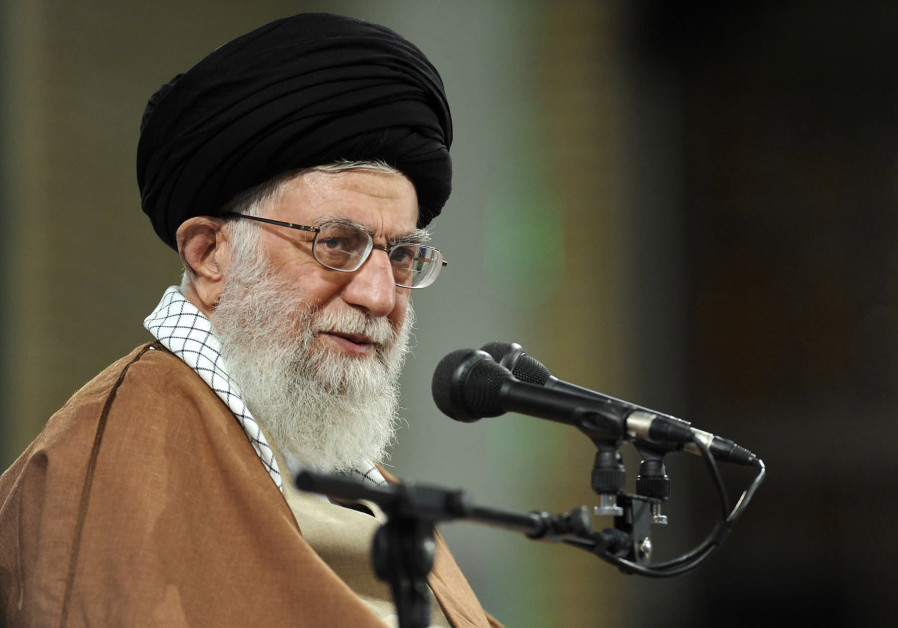Iran increases Hamas funding in exchange for intel on Israel missiles

Iran’s supreme leader Ayatollah Ali Khamenei. (photo credit: AFP PHOTO / HO / KHAMENEI.IR)
Iran has increased their funding to Hamas to the tune of $30 million per month in exchange for intelligence on Israeli missile capabilities.
The major increase of funding, up from $100 million per year, came following a recent meeting in the Iran’s capital Tehran between senior Hamas officials and Iran’s Supreme Leader Ayatollah Ali Khamenei, who expressed willingness to increase the funding, Israel’s Channel 12 news reported.
The Hamas delegation was led by the group’s deputy chief Saleh Arouri and included Moussa Abu Marzouk, Maher Salah, Husam Badran, Osama Hamdan, Ezzat al-Rishq and Ismail Radwan.
According to the report, Tehran asked Hamas to provide intelligence on the locations of Israeli missile stockpiles in exchange for the funding.
The Hamas delegation said they would convey the request to the group’s leadership in the Gaza Strip. The delegation also reportedly asked Iran to act as a mediator with Syrian President Bashar Assad to restore ties following a falling-out during the Syrian civil war.
While ties between Hamas and Iran cooled due to Tehran’s support for Damascus, Arouri has advocated for the rehabilitation of ties in order to increase support from Iran’s Revolutionary Guards’ Quds Force. He has visited Tehran numerous times meeting with its commander, Maj.-Gen. Qassem Soleimani, as well as other senior Iranian officials.
“We are on the same path as the Islamic republic — the path of battling the Zionist entity and the arrogant ones,” Arouri was quoted as saying by Iran’s Fars News Agency during the delegation’s visit.
According to a recent report in Haaretz, Iran and Hamas have agreed to open a second front in the South from the Gaza Strip should a war break out in Israel’s North. Israeli officials have warned that any war that breaks out in the North will not be confined to only one border – Lebanon or Syria – but will be fought on both.
“Iran wants targets for the next war with Israel and they asked Hamas to join them in any future war,” Dr. Yossi Mansharof, Iran and Shi’ite militias expert at the Jerusalem Institute for Strategy and Security and the Ezri Center of Haifa University told The Jerusalem Post. “Arouri agreed to this conditional aid by saying that the group regards itself as the front on the first line of defense [for] Iran. He surely meant that Hamas will join and that if Iran is attacked by the United States or Israel, Hamas will attack Israel.”
“When Hamas cut ties with Syria, Iran decreased funding to Hamas,” Mansharof said, adding that the pressure of the street in Gaza “has pushed Hamas to Iran” for critical financial support.
According to Mansharof, the increase of funding shows that “Iran has managed to bypass the sanctions, [having] exported 710,000 barrels of oil and gas per day in July. Iran is not so pressured economically, and Lebanese media reported that Hezbollah has also been able to bypass the economic crisis,” he continued, adding that Iran’s Foreign Minister Mohammad Javed Zarif “declared that ‘we have a PhD’ in smuggling, and Zarif knows what he’s talking about.”
He added that it is likely that Palestinian Islamic Jihad (PIJ) also received an increase in funding from Tehran.
“We see that the connections between Iran and PIJ are very tight, since the leader of the group Ziad Nakhaleh is very close to Soleimani – so it can be assumed that the group would also get an increase in funding.”
But, Mansharof said, it is unlikely that Iran or Hezbollah would return the favor by coming to Hamas’s aid if a war were to break out between the Gaza based terrorist group and Israel.
“I have the impression that neither Iran nor Hezbollah would help Hamas – not [with] more than smuggling,” he said. “Hezbollah doesn’t want to be attacked by Israel and sacrifice their missiles for Hamas and the Palestinians. Iran also wouldn’t want to have their facilities attacked by Israel for them assisting Hamas.”
`; document.getElementById(“linkPremium”).innerHTML = cont; (function (v, i){ });





Comments are closed.